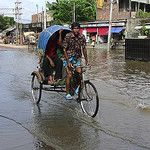Aisling Irwin
Consultant news editor, SciDev.Net
There is a scientist’s version of the phrase “I told you so”, I discovered at the closing plenary of the meeting.
It sounds like this: “The observed changes are already consistent with predicted trends”.
The scientific ‘I told you so’ was the first theme that Steven Wilson, executive director of the International Council for Science, said had emerged during the week-long sessions of the Forum for ST&I and Sustainable Development.
After a stormy session on the Green Economy (which we’ll write about here on Monday), he took the floor to sum up the week. Firstly, he said that plenty of evidence had been presented that planetary damage — and consequent human harm – is already happening. Just like scientists said it would.
The second message emerging from the meeting, he said, was that there is a need for sustained observation — not just one-off bits of science.
For example, sustained observation by the array of buoys that stretches across the Atlantic, measuring the Gulf Stream, has discovered, over time, a surprising variability in flow.
“So, past isolated measurements could well be misleading,” he said.
The third theme of many talks was the “untapped potential of current knowledge”.
He highlighted a survey by Lisa Dilling of the University of Colorado, US, that found that the biggest obstacle cited by people trying to implement climate adaptation was poor access to information. Plenty could be achieved by better application of what is already known.
The final two themes were, in fact, the mantras of the week: the need for integrated science and the need for whole systems solutions.
A fine example of the latter, Wilson said, is the move to consider air pollution and climate change together – because some pollutants have the potential to warm the atmosphere and others to cool it.
ICSU will soon publish the outcome statements of this meeting, but it is unlikely that anything newly concluded this week would find its way, by any official means, into next week’s Rio+20 conference – at this stage the official channel for S&T input is just two minutes wide.
The benefits are more likely to accrue from the organisers having taken advantage of the greater magnet of Rio+20 and drawn a multinational and multidisciplinary audience. There were 5-600 delegates from over 70 countries, according to Wilson.
Before the meeting, Gisbert Glaser, senior science advisor at the International Council for Science, which organised the meeting, said the goal was to help drive forward the post-Rio+20 implementation.
Such an impact will be hard to measure. But, reviewing the 500+ events scheduled for the Rio+20 period, it is evident that, without this meeting, science would have been a much softer voice in the melee.
This blog post is part of our Forum on Science, Technology and Innovation for Sustainable Development blog which takes place 11-15 June 2012. To read news and analysis from the conference please visit our website.




You must be logged in to post a comment.